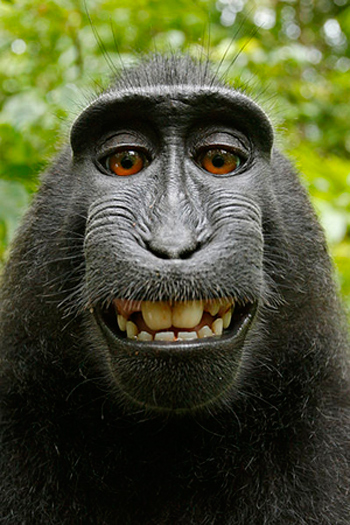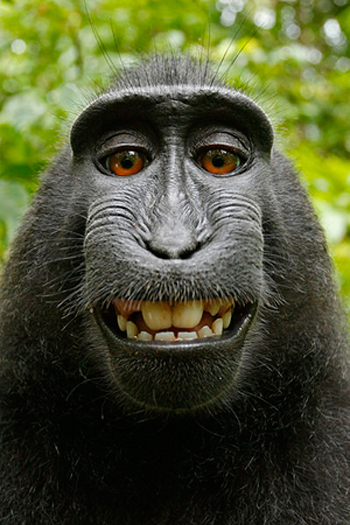British photographer claims selfie-snapping monkey is ruining his livelihood


Monkey see, monkey sue.
Actually, British nature photographer David Slater is the one threatening legal action against Wikimedia Commons. Slater told The Telegraph that the online collection of free-to-use images and videos is refusing to delete a photograph of a crested black macaque, which was taken with his camera. The only problem is that Slater did not actually snap the photo — the monkey did:

Slater traveled to Indonesia on a photography trip in 2011, and while there, one of the animals grabbed his camera and took hundreds of photographs. Many were unusable, but quite a few more were delightfully unique selfies. Slater initially hyped the image, which was reported on by a variety of newspapers, magazines, and websites. But now the photographer says Wikimedia refuses to take the image off its website, despite not getting permission from Slater to use it.
The Week
Escape your echo chamber. Get the facts behind the news, plus analysis from multiple perspectives.

Sign up for The Week's Free Newsletters
From our morning news briefing to a weekly Good News Newsletter, get the best of The Week delivered directly to your inbox.
From our morning news briefing to a weekly Good News Newsletter, get the best of The Week delivered directly to your inbox.
"They've got no right to say that it's public domain. A monkey pressed the button, but I did all the setting up," Slater said. "For every 100,000 images I take, one makes money that keeps me going. And that was one of those images. It was like a year of work, really."
A year of work for Slater, a moment of selfie-snapping fun for a macaque that is (hopefully) happily zipping around Indonesia right now, utterly oblivious to the uproar it's caused.
**Update: An earlier version of this story stated that the Wikimedia Foundation claimed the monkey owned the copyright because it took the photograph. However, the Wikimedia Foundation report says it "received a takedown request from the photographer, claiming that he owned the copyright to the photographs. We didn't agree, so we denied the request." The Wikimedia Foundation says this is because the monkey did take the image, and therefore the photographer does not own copyright over it — but that the monkey does not own the copyright, either.
A free daily email with the biggest news stories of the day – and the best features from TheWeek.com
Sarah Eberspacher is an associate editor at TheWeek.com. She has previously worked as a sports reporter at The Livingston County Daily Press & Argus and The Arizona Republic. She graduated from Northwestern University's Medill School of Journalism.
-
 Did Alex Pretti’s killing open a GOP rift on guns?
Did Alex Pretti’s killing open a GOP rift on guns?Talking Points Second Amendment groups push back on the White House narrative
-
 The 8 best hospital dramas of all time
The 8 best hospital dramas of all timethe week recommends From wartime period pieces to of-the-moment procedurals, audiences never tire of watching doctors and nurses do their lifesaving thing
-
 ‘Implementing strengthened provisions help advance aviation safety’
‘Implementing strengthened provisions help advance aviation safety’Instant Opinion Opinion, comment and editorials of the day
-
 Nobody seems surprised Wagner's Prigozhin died under suspicious circumstances
Nobody seems surprised Wagner's Prigozhin died under suspicious circumstancesSpeed Read
-
 Western mountain climbers allegedly left Pakistani porter to die on K2
Western mountain climbers allegedly left Pakistani porter to die on K2Speed Read
-
 'Circular saw blades' divide controversial Rio Grande buoys installed by Texas governor
'Circular saw blades' divide controversial Rio Grande buoys installed by Texas governorSpeed Read
-
 Los Angeles city workers stage 1-day walkout over labor conditions
Los Angeles city workers stage 1-day walkout over labor conditionsSpeed Read
-
 Mega Millions jackpot climbs to an estimated $1.55 billion
Mega Millions jackpot climbs to an estimated $1.55 billionSpeed Read
-
 Bangladesh dealing with worst dengue fever outbreak on record
Bangladesh dealing with worst dengue fever outbreak on recordSpeed Read
-
 Glacial outburst flooding in Juneau destroys homes
Glacial outburst flooding in Juneau destroys homesSpeed Read
-
 Scotland seeking 'monster hunters' to search for fabled Loch Ness creature
Scotland seeking 'monster hunters' to search for fabled Loch Ness creatureSpeed Read
